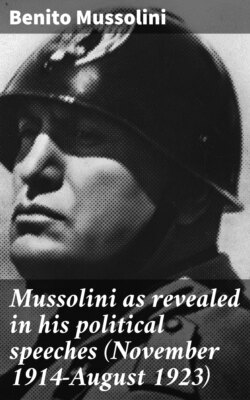Читать книгу Mussolini as revealed in his political speeches (November 1914-August 1923) - Benito Mussolini - Страница 12
На сайте Литреса книга снята с продажи.
IN CELEBRATION OF VICTORY
ОглавлениеTable of Contents
Speech delivered at Milan, 11th November 1918, before the Monument of the “Cinque Giornate.”
Milan, notwithstanding its multi-coloured local Socialism, had ever remained the burning heart of the country’s resistance and spent herself lavishly for the war. On the morrow of the memorable day of Vittorio Veneto she gave herself up to unrestrained manifestations of patriotic joy.
Benito Mussolini—the ardent advocate of intervention in the harassing times gone by, the indomitable fighter in the Carso trenches, and the fervent advocate of resistance in the hour in which the enemy’s friends were crying for “peace at any price”—Benito Mussolini may well be considered as one of the principal artificers of victory.
The people of Milan felt this in the triumphant rejoicings and the Editor of Il Popolo d’Italia was acclaimed by public gratitude for his part in the union of hearts.
My brothers of the trenches, Citizens! I have never before felt my inefficiency as an orator as deeply as I do now in the face of the greatness of the events and your memorable and imposing manifestation. What can I say to you, when this manifestation is already more than a speech, a hymn—more than a hymn, an epos?
We have arrived at this day after many hardships. I see here, gathered round the monument of the Cinque Giornate, which is the altar of Milan, those who fought first and last, those of the trenches who are the survivors of the sacrifice of devotion, who marked with their blood the destinies of the country, and the disabled who feel themselves no longer maimed since Italy has become great. I see beside them the refugees, who will soon return to their lands and deserted hearths. I remember what I said last year; we must love these brothers of ours, warm them by our firesides, and still more in our hearts. And I see the people of Milan joined together like all the Italian people in a superb act of love.
How many different events in the course of a year! Do you remember these days a year ago? Do you remember last year at the Scala when we swore that the Germans should not pass the Piave? And they did not pass, and the then line of resistance became afterwards the line of advance towards victory. Even in the darkest hours I did not despair, and paid homage to the fighters. We saw in those days the first “poilus” and “tommies”; it was the Entente coming to cement the Alliance in our trenches. After a year of faith and sacrifice has come victory.
We think with gratitude of the fine leaders who led us on to victory, but also, still more, of the anonymous mass of soldiers, our marvellous people, who resisted the invasion on the Piave, and from the Piave sprang forward to rout the enemy.
Remember it here—here where we held the first meeting for war—here, with Filippo Corridoni. (The crowd give a prolonged ovation to the memory of Filippo Corridoni.) We wanted the war, because we were obliged to want it, because it was imposed by historical necessity. To-day we have realised all our ideals; we have secured our national aims; the Italian flag to-day flies from the Brenner to Trieste and Fiume and Italian Zara. We did not know then that there were Italian infantry on the other side of the Adriatic. Now, in all the cities and villages on the eastern shore, the Italians have planted the flag of their country, because that shore, which is Italian, must remain Italian.
We have also accomplished the international aims of our war. When we said, four years ago, that the red flag must wave over the castle at Potsdam, the dream appeared madness. To-day the Kaiser has fled, and with the passing of the Hohenzollerns passes militarism.
The most magnificent political panorama which history records unfolds itself before the eyes of the astonished world. Empires, kingdoms and autocracies crumble like castles built with cards. Austria no longer exists; to-morrow there will no longer be Imperialist Germany. We, with the sacrifice of our blood, have given the German people liberty, while the German people have made a holocaust of their blood in order to deliver us over to the chain of imperialism and military slavery. Upon the ruins of the old world is outlined the dream of a League of Nations.
Victory must also see the realisation of the aims of war within the country—that is to say, the redemption of labour. From now onwards the Italian people must be the arbiters of their destinies, and labour must be redeemed from speculation and misery.
Citizens! At Trento there is the statue of Dante with his hand outstretched towards the Alps. It seemed before that the reproach of the great poet:
Ahi! serva Italia, di dolore ostello,
Nave senza nocchiero in gran tempesta,[3]
rang out admonishing the country. But Italy to-day is no longer a slave, she is the mistress of herself and her future. She is no longer a rudderless ship in a storm, because a glorious horizon has been opened up by her victory.
3. .sp 1
Alas! Slave Italy, the home of all griefs,
A ship without rudder in a great storm.
And the people are the rudder of this ship, which, between three seas and three continents, sails serenely and securely towards the port of supreme justice in the light of the redeemed humanity of to-morrow. (Prolonged applause.)
